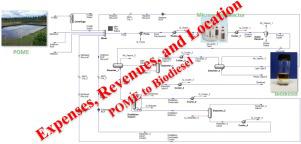Process Safety and Environmental Protection ( IF 6.9 ) Pub Date : 2021-02-16 , DOI: 10.1016/j.psep.2021.02.011 Harry Waudby , Sharif H. Zein

|
This paper examines a green approach to produce industrial-scale biodiesel from a palm oil mill effluent (POME) using Microwave Heating. Kinetic data were determined for this reaction and implemented into the Aspen HYSYS simulation software to produce an economic analysis of the process. It was found that the process is economically feasible with the inclusion of significant recycle streams and additional separation equipment. It was found that Malaysia might be the best location to repurpose palm oil mill effluent (POME) because of palm oil production density. Thailand provides modest sea access and the best direct connection with mainland Asia, proving advantageous when distributing biodiesel fuel. Although Malaysia shares this connection to the mainland, terrestrial transport would have to travel a greater distance, increasing costs and emissions. Indonesia, however, offers the largest number of potential plant locations with direct sea access.
中文翻译:

使用微波加热从棕榈油厂废水中生产工业规模生物柴油的循环经济方法:设计,模拟,技术经济分析和位置比较
本文研究了一种使用微波加热从棕榈油厂的废液(POME)生产工业规模生物柴油的绿色方法。确定该反应的动力学数据,并将其导入Aspen HYSYS仿真软件中,以对该过程进行经济分析。发现该方法在经济上是可行的,包括大量的再循环料流和附加的分离设备。人们发现,由于棕榈油的生产密度大,马来西亚可能是重新利用棕榈油厂废水(POME)的最佳地点。泰国提供适度的海上通道,与亚洲大陆的最佳直接联系,证明在分配生物柴油燃料时具有优势。尽管马来西亚与内地有这种联系,但地面运输必须走更远的距离,增加成本和排放。但是,印尼提供了最多的潜在工厂位置,可直接通海。











































 京公网安备 11010802027423号
京公网安备 11010802027423号